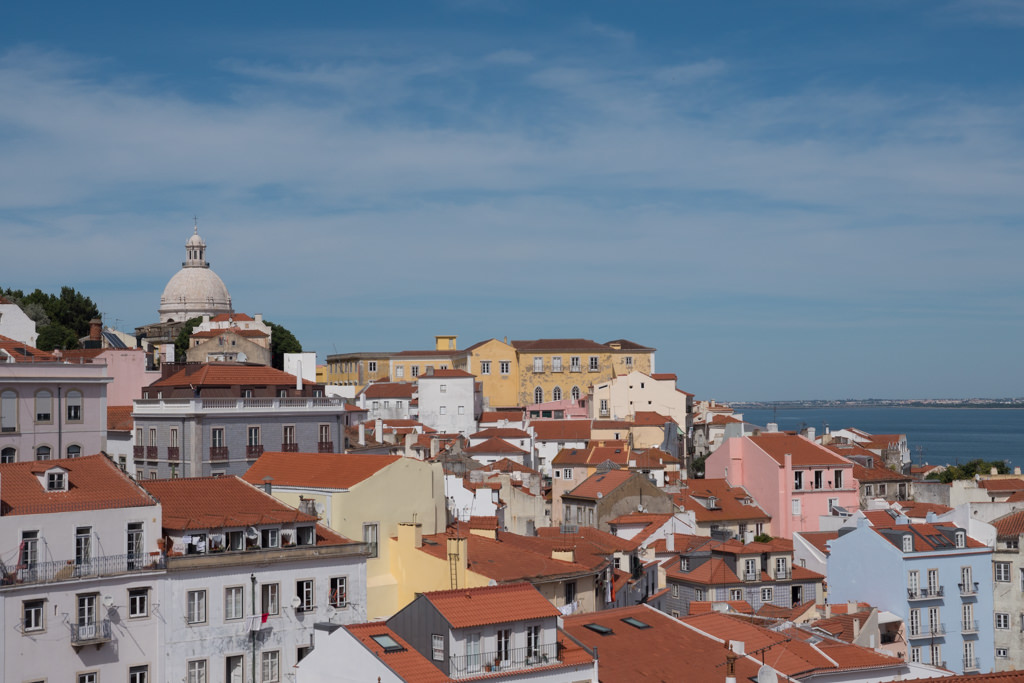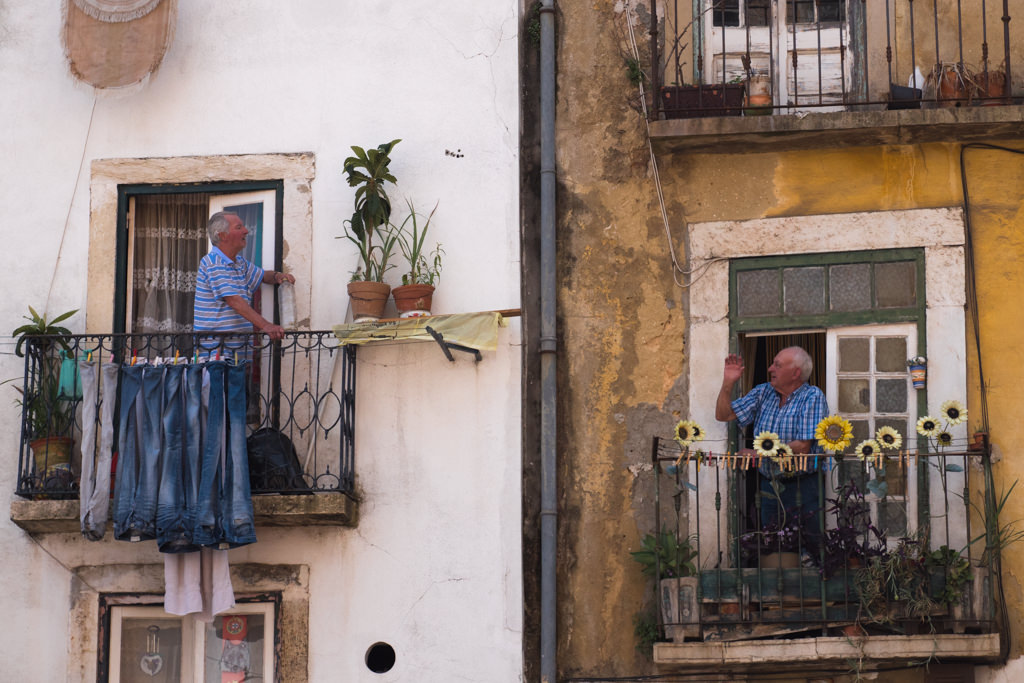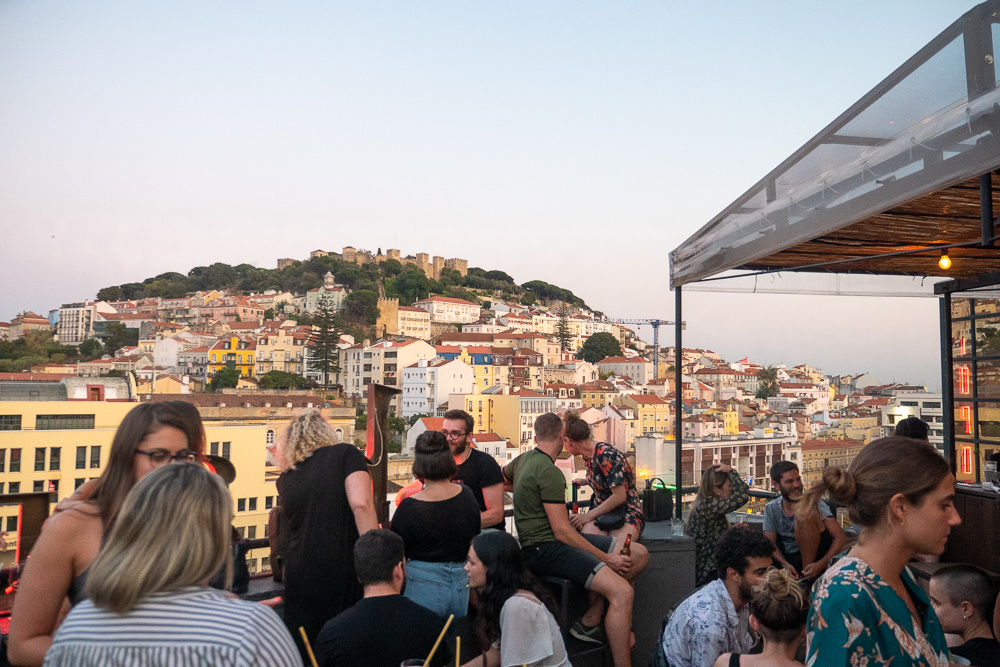10 Things You Should Realistically Know

Table of Contents
Lisbon is getting a lot of buzz lately as a place to live, particularly as more people look for places to live and work remotely from.
I moved to Lisbon in 2016, before the current huge wave of interest in the Portuguese capital. Living here has been a fantastic change in terms of lifestyle, though I also noticed that some of the information about Lisbon can be hyped up or neglected to tell both sides.
Because a lot has also changed in Lisbon in the past couple of years, I thought I’d share my honest perspective here.

1. The secret is definitely out
Lisbon used to be quite an overlooked capital in Europe, but that is no longer the case. Especially since the pandemic hurdled remote working into the mainstream, there has been enormous interest from foreigners wanting to move to Lisbon.
The most-talked-about trend in Lisbon is the many Americans (especially Californians) who have flocked to it recently. While Brazilians, French, and other nationalities account for a greater share of newcomers overall, Americans seem to be in the spotlight in the media because of their relatively strong purchasing power.
This has unfortunately led to property prices rising disproportionately and rents rising as well. To put it bluntly, the Californians who are escaping places like SF that have been too gentrified are now gentrifying Lisbon. It’s become a major crisis for locals, but even many foreigners are being priced out of Lisbon.
There is therefore a lot of talk lately about how Lisbon is maxed out. The huge interest in the city has triggered a housing crisis and the influx of digital nomads has become a matter of national public debate and even protests. In early 2023 the government announced a set of 10 new measures to cool the housing market, but it’s unclear if or when they’ll be implemented.
Lisbon may still be a great opportunity, depending on your perspective, though it’s no longer the bargain or hidden gem it once was. If you’re coming from downtown New York, Lisbon will surely seem ‘cheap’, but it’s now murderously expensive in a local sense and even pretty expensive at a European level.
If you decide to move to Lisbon, be sure to educate yourself about the local housing market. Some foreigners are known for basically just paying the quoted price (and often in cash) without negotiating at all or being aware of local property prices. Don’t overpay so as to not artificially inflate the market, which is making it very hard for Portuguese to live in their own city.
2. It can be hard to find a place
The high demand can make it challenging to find a place to live — at least, of the size and in the area that you want. This was already a challenge when I moved here in 2016 and this is now doubly true.
As you explore Lisbon you’ll soon see that there are countless buildings needing to be renovated and the availability of high-quality housing is limited.
Something to know is that the city has relatively many houses for sale, but fewer places to rent (at least for the medium or long term).
The issue is that the Portuguese tend to buy houses and not rent them, so the availability of rentals is already fairly low.
If you’re renting, be sure to follow sites like SAPO, IMO Virtual or Bquarto. Check out the Portuguese classifieds site OLX as well.
3. Local jobs don’t pay so well
If you work online while living in Lisbon (like I do), then you’ll be unaffected by the local salary levels. But if you’re looking for a job in Lisbon, just know that you’d be lucky to earn over 1000 EUR a month for a skilled job.
Portuguese salaries are low by Western European standards, with around 675 EUR a month now being the minimum wage (when calculated on a 12-month basis — Portugal has a ’14-month salary’ system so you have to convert it).
Many younger international residents end up working for call centers such as Teleperformance, which employ thousands of foreign language workers. There seems to be a decent demand for English-as-second-language teachers as well.
You’ll be in an ideal position if you have an income independent of Portugal. There is a growing startup, remote worker, and digital nomad scene in Lisbon, with tons of co-working spaces and startup incubators around.

4. Apart from housing, cost of living is still low
Local salaries may be low and rents and property prices may have skyrocketed, but it’s true that other aspects of life in Lisbon remain affordable. This is especially the case if you’re used to northern European prices. Numbeo has a great cost of living overview.
Central Lisbon has gotten much pricier due to the tourism boom, but as a local resident you can still easily get around this, for example by avoiding tourist restaurants and eating in your local neighborhood. Things such as food and drinks and transportation are relatively cheap, though housing prices are ever-increasing and you’ll have to properly factor this into your budget.
When not looking strictly at housing, the cost of living in Lisbon does remain attractive when considering costs such as restaurant meals, transportation, etc.
5. There is significant bureaucracy
Not everything in Portugal exactly operates with perfect efficiency, to say the least. Many expats are not at all prepared for the sheer headache that is Portuguese bureaucracy.
Public servants can be highly unmotivated, can give you highly conflicting information, and may decide to help or not help you entirely based on their mood that day. The government service desks bizarrely all close in the early afternoon. Processes are often needlessly complicated or uncoordinated; opening a bank account required me to sign a dozen different agreements.
It’s telling that when I went to consult with an expat tax consultant when I first came to Portugal, they advised me to stay out of the Portuguese system as much as possible. “Don’t give yourself a headache,” they said.
I’ve had some frustrating situations while setting up here. I once got caught in a loop where I needed Document A to get Document B, but to get Document A you already needed B. My Portuguese residency papers say I’m of British nationality even though I’m Dutch because, as the public servant told me, the drop-down menu in the registration program didn’t show Dutch as an option. I was told not to worry about it. (I definitely should have worried about it as it messed up all my other registrations!)
Seemingly simple issues can turn into crazy labyrinths. I recently had to get some vaccination shots before traveling to a tropical country and this sent me into mind-bending loops between various health. entities with no clear way to make an appointment. Under the NHS in the UK, this would have taken 5 minutes to schedule.
In my home country, The Netherlands, I can call the tax authority hotline and have a question answered within 10 minutes; in Portugal, you’ll probably end up on an epic quest taking weeks.
I’m not complaining of course. I chose to live here and this is simply how things work. I’m just trying to sketch an accurate portrait of Portugal, so that you may know what to expect. Even though this country does try to portray itself as a startup hub and innovator, it’s still extremely old-school when it comes to many government functions, customer support, etc.
That said, the basic things you need to do are usually not too complicated. Your first step after moving is to get a tax identification number called a NIF. You need this to do anything like renting a place or opening a bank account. Unless you’re particularly unlucky, getting a NIF takes just 10 minutes at the Financas office.

The Portuguese healthcare system seems to be of good overall quality, albeit known for being slow and understaffed. Getting some private medical insurance (such as from Medis) can get you faster treatment. The insurance packages are very inexpensive compared to other parts of Europe, and (it must be said) eye-poppingly cheap compared to the US.
Expect to sometimes need some patience to navigate the Portuguese systems. You’ll also sometimes get several conflicting answers from different people (or even the authorities) on how things are supposed to work. It’s best to just shrug this off, not think about it too much, and get things done in any way that seems to work.
6. It’s worth learning some Portuguese
The Portuguese are excellent English speakers, so you’ll rarely have any trouble communicating, especially with the younger generations who learned English from an early age. Movies and TV shows are subtitled instead of dubbed.
It’s nevertheless worth learning some basic Portuguese as it will still help you out a ton! It’s not known as an easy language to learn, but knowing at least some basics will aid in your everyday life. I think it’s also an important part of living somewhere and trying to integrate, regardless of how long you intend to stay.
Starting to learn Portuguese can feel a bit overwhelming, as it has the reputation of being a difficult language to learn (and it’s very different from Spanish). This blog has some great advice for how to self-teach, take classes, or immerse yourself in the language.
7. Portuguese are reserved but friendly
It is true that the Portuguese are friendly, relaxed, and tolerant people. The claims made by those promoting Portugal abroad I found to be true. I love the Portuguese and their down-to-earth attitude.
What’s not often said is that Portuguese can also be a bit quiet or stoic. The temperament may, at times, seem closer to Norwegians and Fins than Spaniards or Italians — or at least, that’s my impression.
That could be a generalization, but some foreigners do talk about the Portuguese being a bit more reserved and that local connections take a bit longer than expected to develop. Then again, I’ve heard the same said from foreigners about living in my home country of the Netherlands, so maybe it’s just something that all immigrants have to deal with.
Still, someone once told me, “some cultures are like coconuts, and others are like peaches — either hard on the outside, or hard on the inside”. Brazilians might be the quintessential peaches: the stereotype is that you could easily get invited for a beach BBQ by someone you’ve literally just met, but closer friendhips are harder to establish. The Portuguese are a bit more like coconuts: once you are through the outer shell, you can get to know them better.
A huge number of Portuguese have worked abroad, especially in the UK and Luxembourg. It’s often these international Portuguese you’ll be first to meet, as they like to mix with other cultures in the same way they did when living abroad themselves.

8. Winter is a bit weird
Winters have a different feel to them in Portugal than they do in the north of Europe.
That’s in part because many apartments don’t bother having central heating as this would just sit unused for most of the year (this is especially true for the charming older houses that many foreigners like to live in).
That does mean that December and January get cold AF at times. Bizarrely, it’s often colder inside than it is outside.
Winters are less cozy than in northern Europe and more just… well, cold? During the winter months, you may just have to keep under the blankets or stay near an electric heater.
This is, of course, a small price to pay for the ten months of good weather you get during the rest of the year.

9. Groups and meetups help you settle in
There are a ton of Lisbon-specific Facebook groups where you can get answers to many questions or find other internationals.
A very active group is the Lisbon Digital Nomads, which organizes weekly meetups in Lisbon as well as comedy nights and other fun activities.
Couchsurfing has a weekly meetup on Wednesdays in Cais do Sodre that is attended by internationals, travelers, and some locals. The bar where it’s held isn’t Lisbon’s best, but it’s a nice event for meeting people when you’ve just arrived.
Older expats and career professionals often connect via platforms like Internations. Other events get regularly posted on Meetup.com.
Basically, it doesn’t have to take long to build up a social circle in Lisbon.
10. You do get a great quality of life
I’m not gonna lie: the quality of life in Lisbon is pretty great.
The climate is possibly the best in Europe, with about 9 or 10 months of good weather, and without the summer ever getting too hot.
I’m getting a lot of mileage out of my picnic gear, and with plenty of beaches within 30 to 60 minutes of Lisbon, you can have a sun-and-surf lifestyle while still living in a city. There is always something to do, with tons of festivals and cultural events.
Lisbon is big enough to have all the big city things, but still small enough to have a great sense of community. I lived in London before which I came to really dislike mostly due to its sheer size, but Lisbon is a lot friendlier in size.
That said, the ‘quality of life’ is relative to your income level and for many locals the city center is no longer affordable. This I believe has a negative quality-of-life effect for everyone; turning Lisbon into a city only for foreigners is not desirable even for the foreigners. The local aspects that attracted people like me in the first place may disappear if the situation is not rebalanced.
When researching Lisbon as a potential place to live, I recommend looking for up-to-date recent information, current impressions from online groups, and so on, as the picture has changed quite a bit from just a few years ago.
Some links may be affiliate links, meaning I may earn commission from products or services I recommend. For more, see site policies.
Posted SEP 22, 2023







